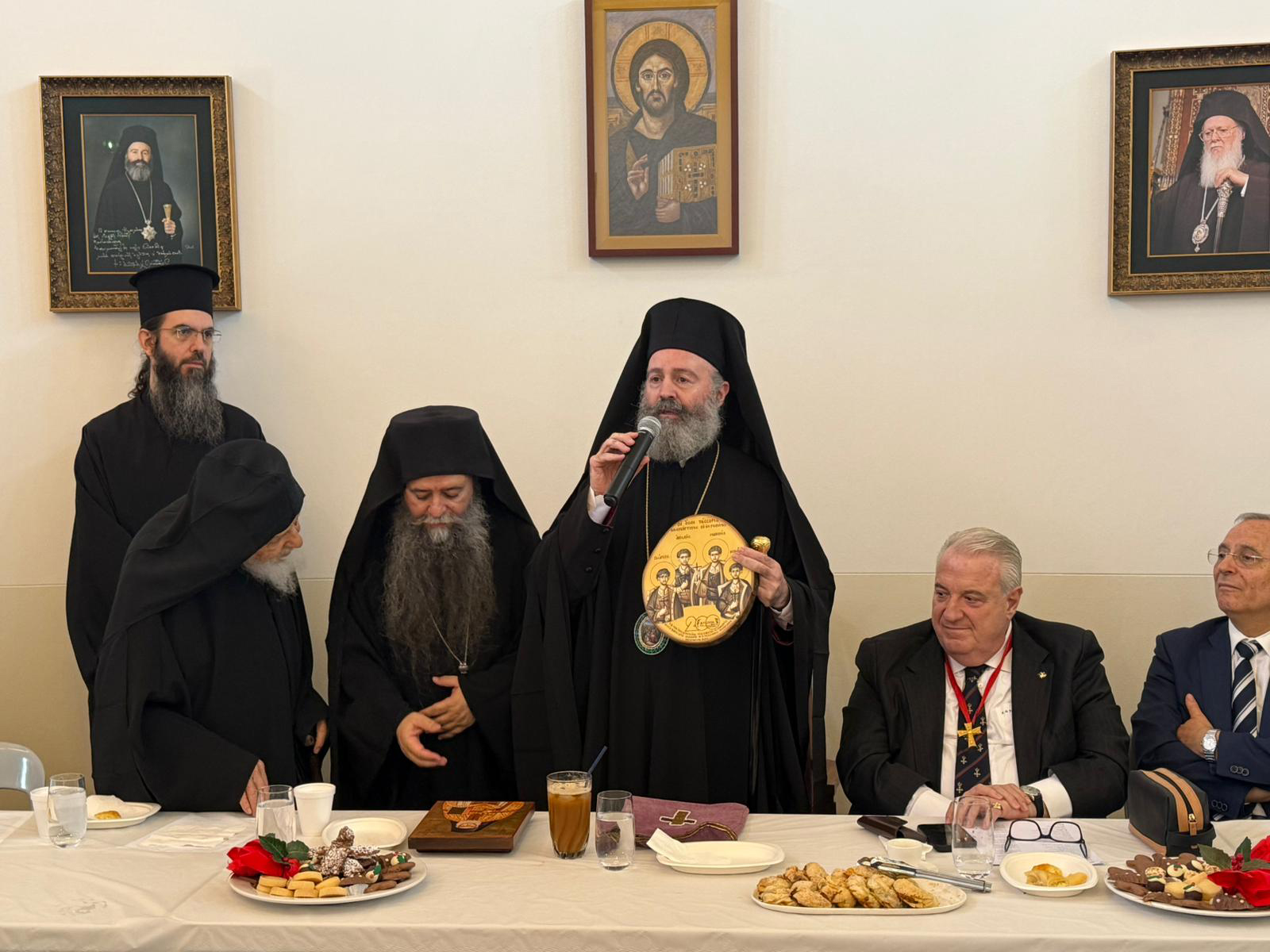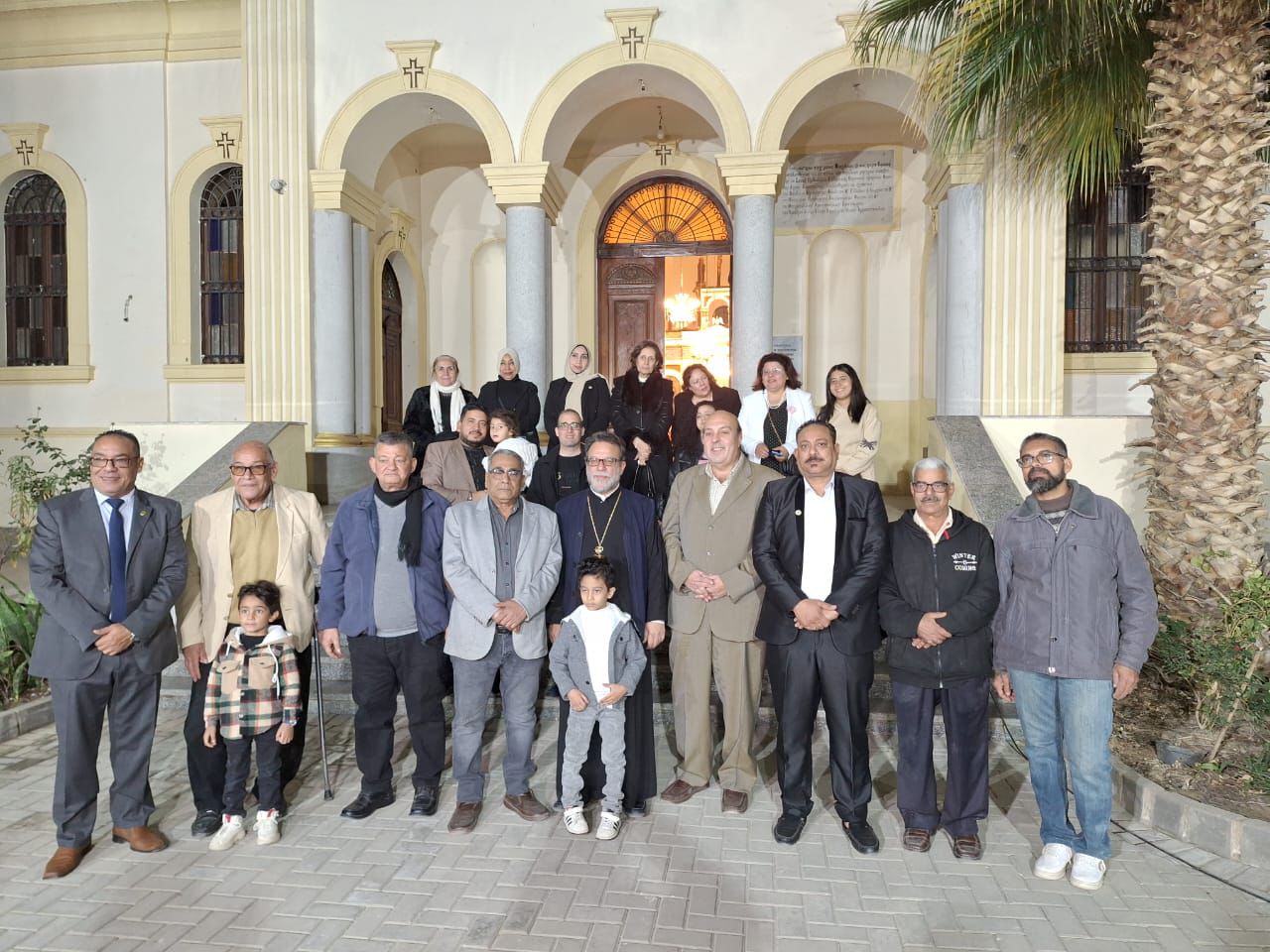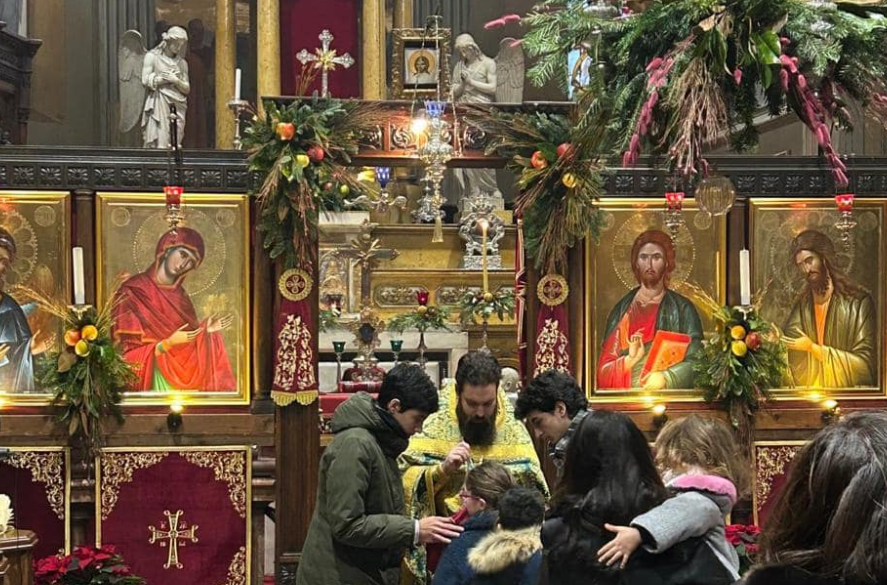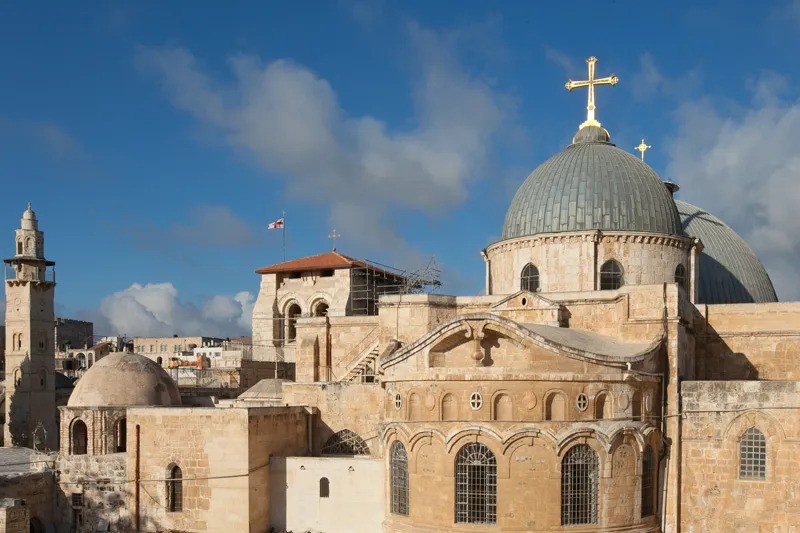The Resurrection of Mankind


In the magnificent service on Great Friday, we sang the compelling and wonderful doxastiko from the ninth hour ‘Today he who hung the earth on the waters hangs upon the cross’, which ends ‘we venerate your Passion, Christ. Show us your glorious Resurrection’.
Thereafter, in the doxastiko of Vespers on Great Saturday, the day ‘on which the only-begotten Son of God rested from all his labors, through the dispensation of death’, we saw that the Lord rested in the body, because this is the blessed Sabbath, the great day of the Lord’s rest.
And today, the maker of heaven and earth ‘returns to where he had been…’ and shows us his glorious Resurrection. So the holy day of Easter has arrived this year, too, as a refreshing breeze in this distraught and beleaguered world. He came, he returned alive, in order to fill us with joy and awaken in us the profound sense that we’re eternal and that our last enemy, dread death, has now been conquered.
The Risen Lord has opened to us the way to the heavens again, ‘shattering the bronze gates’. He raised us, reconciled us to God the Father and removed the obstacles to our unimpeded progress towards eternity, the ‘enduring city’, celestial and indestructible.
Every year, with hymns and praises, odes and troparia, ‘timbrel and dance’, symbols and ceremonies, adorned with precious materials, art, sweet-smelling vestments and flowers, even with choice foods, in other words with all our human, spiritual and natural riches, the Church attempts to bring us into this joyous ambience. Everything is overflowing with joy, ebullience and exuberance, in order to give us a taste of the glory and sweetness of Paradise and to bring us to the great revelation of our soul: that today, we’re celebrating not only the Resurrection of the Lord, the proof of the power of the Father, but, even more so, our own resurrection, the inheritance of eternal life, which Christ has bestowed upon us as an irrevocable and unique gift, by his death and Resurrection.
It is Saint Luke the Evangelist who first relays the answer of the Lord regarding the resurrection of the dead, that: ‘those who are counted worthy to attain the resurrection from the dead… cannot die anymore, for they are equal to the angels and are sons of God, being sons of the resurrection’. And with extraordinary boldness and clarity, Saint Paul says in his chapter on our own resurrection: ‘But if there is no resurrection of the dead, then Christ has not risen. And if Christ has not risen, then our preaching is empty and your faith is also empty… If in this life only we have hope in Christ, we are the most pitiable of people’.
The truth is, however, that Christ has risen and has instituted the resurrection of all the departed. Because, just as death came into the world through one person, so, through another person, came the resurrection from the dead. Just as we all die through our kinship to Adam, so, because of our kinship to Christ we are all brought back to life.
The key to our own resurrection, then, is produced from the precious, indestructible and unblemished gold of the Lord’s Resurrection. Without the Lord’s Resurrection, what good are actions, struggles and sacrifices? As Saint Paul says a number of times, why would we risk our lives every day? ‘If I fought with beasts at Ephesus [for purely human reasons not for God and the hope of the good things to come], what advantage is it to me? If the dead do not rise, “Let us eat and drink, for tomorrow we die!”’.
The foundation of our Orthodox faith is set on the unshakeable rock of the Lord’s Resurrection. In essence, this is what we confess, this is what we suffer and die for, in the belief and hope of our own resurrection. The Resurrection of the Lord is a loving dialogue of speech, joy and communion with God and discourse with his name. It is this which has made him our personal, living hope in the titanic struggle of the spiritual life against sin, which wants to return us to the law and subject us to its bonds. Sin actually has no hold over us because we’re under grace, not under the law.
Every day, at every moment Christ, who became our hope, gives us the opportunity to pick ourselves up after our lapses and to free ourselves from servitude to sin, which subjects us to the law of sin and occupies our members. Saint Paul rightly cries: ‘Wretched man that I am! Who will deliver me from this body of death?’. And answers immediately: ‘ I thank God- through Jesus Christ our Lord!’. Jesus Christ, our Risen Lord, because now there’s no condemnation of his people… Because of him, the law of the Spirit who gives life has liberated us from the law of sin and death.
In this way, the Lord’s Resurrection isn’t just a great or eternal message, but constitutes an everyday event and personal experience in the course of our life on earth. There’s nothing other than the Resurrection that is powerful and timely enough to provide us with comfort, strength, and courage. Nothing else that can give life, happiness and future glory to us and humanity as a whole.
The Spirit of the Father, the Father who raised Jesus from the dead, will give life to the bodies of those who are dead from every manner of suffering, doubt, questioning and trials. He’ll do so through his breath which abides within them, when this perishable body is clad in permanence, when the mortal is robed in immortality. Then the words of Saint Paul will ring true: ‘Death is swallowed up in victory. Death where is your sting? Hades, where is your victory?’.
But the Lord’s Resurrection didn’t make us imperishable and unchangeable here and now, but God left us mutability as a blessing in order to keep his original promise towards us: that of our freedom. Our fall didn’t alter God’s intention; it simply changed his plan, but kept freedom as the essential component of human nature, which no sin, no disaster, no war, pandemic or extreme condition can abolish. Mutability, as the soaring theologian Saint Gregory of Nyssa so wonderfully says, is not merely the opportunity of a change for the worse, because then no good would ever be done, if human nature constantly leant towards the opposite. Now the greatest achievement of mutability is the practice of the virtues; it’s like a wing which helps upward flight, rather than a downward spiral. In this way, the ‘terrible thing that is mutability’ becomes a power for change for the better. The saint urges us not to be sad when we ‘see the inclination of our nature towards change, but let us be changed for the better, transformed from glory to glory’.
Finally, the Lord’s Resurrection inaugurated and renewed the reconciliation of the imperishable with the perishable; it allowed the entry of uncreated divine grace into the earthen vessel, as of yore in paradise, so that, after his Resurrection, the Lord could enter the place where his disciples were gathered ‘behind closed doors’. They were talking about what had happened in Jerusalem; that the Lord had risen; and that he’d been revealed to them at Emmaus ‘at the breaking of the bread’. They thought they were seeing a ghost, but he calmed them and said: ‘Look at my hands and feet to confirm to yourself that it’s really me. Feel and be convinced, because a ‘ghost’, a ‘spirit’ doesn’t have flesh and bones as you see I have’. And so he showed them his hands and feet to convince them utterly.
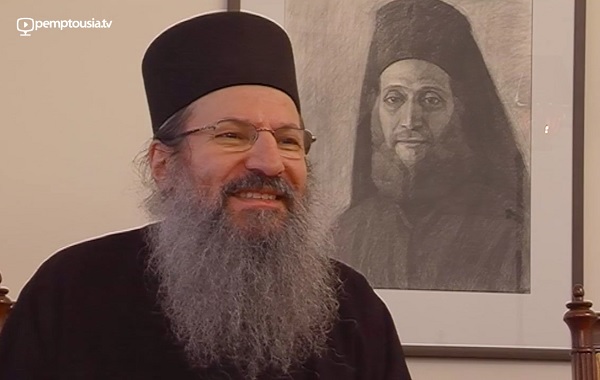

In the person of Christ, then, there coexists concurrently, without confusion or division, the created and the uncreated; the divine grace of the Holy Spirit within the temple of the body of Christ, who is both God and human, and, as a gift, by grace in the temple of the body of us mere humans. In the natural world, the main, the swiftest, the most highly conducive element in its workings is light, which came into being at the word of God the Creator. In the spiritual world, that of the relationship and mutual communion between God and us, light is again the direct means. The light of the sun illumines nature, the true light of God ‘illumines every person who comes into the world’, so that, ‘in the light of the person of Christ’ we’re able to see the inaccessible, the immaterial light. Over the centuries, this light has sealed every divine manifestation revealed in the events and persons of the people of God. The light which Christ’s tomb, ‘more brilliant than any bridal chamber’, emitted at the hour of the Resurrection is the light of Christ’s person, it’s his own identity, it’s his wonder-working energy, it’s his grace, which stamps the life of all the saints, without exception, ancient and modern. In private conversation, the newly-canonized Saint Efraim Katounakiotis related that, in spiritual rapture, he saw Christ ‘in all his glory’. He went up to the top of the hill next to his kelli and shouted all around, even to the angels, to get out of the way and not to impede this vision of the divine light. And he wasn’t alone in this. Saint Païsios tells us that ordinary monks with pure hearts, who had lost their physical sight, could see the true light and that the whole of their surroundings- their kelli, the brooks and the dells- were full of the light of Christ. His Resurrection has bestowed upon us the unwaning, never-dimming light of Christ.
Our natural and, particularly, our spiritual senses are attuned to the divine light. Our nous and spirit are illumined; they understand and feel; they’re united and gain in power; and they begin the great task of approaching and knowing God. As another great saint, Nikolaj of Ochrid, says, people who are focused and at one with themselves have much power in this world; they’re resurrected. And Elder Aimilianos adds that this experience of receiving the light of the Resurrection is something ‘we feel as a reflection in the depths of our existence… but in essence we see the depth of the divinity of Christ… These are things bestowed by God not on the wise or the clever and so on, but on those who simplify their existence… and fix their internal eye on God. These are the people to whom God grants vision’.
Keeping the gifts of the Resurrection of the Lord as precious treasures, let us offer him, dear readers, a few words of prayer borrowed from the great poet, philosopher and saint, Nikolaj of Ochrid: ‘My faith sees you, Lord; this is the light and insight of my eyes…My hope is expecting you, Lord. Expectation of you is the sole content and only meaning for my tomorrow and the days thereafter… (I know that) heaven doesn’t fulfil hopes but Hope. Love makes me God and you, God, human!
The Lord is and becomes the Risen Lord, he’s my Risen Lord who raises the dead “from the morning until nightfall and from dusk to dawn”. What is more befitting to the living God than to raise the dead to life? Let others believe in a God who summons people and condemns them. I shall cleave to the God who raises the dead’.
The light has emanated from the tomb; come and take it. Now faintly, more intensely in the eternal day of the kingdom of God. Let us unite our voice with that of our holy Father, Saint John Chrysostom: ‘For Christ has risen from the dead, and has become the first-fruit of the departed. To him be glory unto the ages of ages. Amen’.
Source: pemptousia.com


